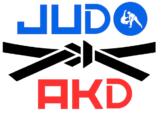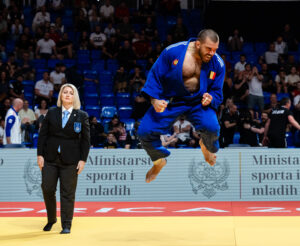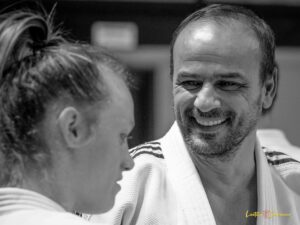Born on 13 March 1990 in Vanier (Canada), Antoine Valois-Fortier spent a decade as one of the leading lights in the highly competitive U81kg category. An unexpected bronze medallist at the age of 22 at the 2012 Olympic Games, Nicolas Gill’s protégé went on to confirm that his London podium finish was anything but a fluke. World medallist in 2014, 2015 and 2019, a model of application and commitment despite a back that often needed strengthening, the three-time Pan-American champion crossed swords on numerous occasions with the likes of Takanori Nagase, Loïc Pietri, Saeid Mollaei and Travis Stevens. Retired just after the Tokyo Olympics, and the proud father of a little Louis a few months later, ‘AVF’ wasted no time in switching back to national coaching, with the particularity of accompanying athletes who had been his training partners just a few weeks earlier. It was a very busy Olympiad, with three seasons instead of four. When this interview begins in the spring of 2024, Antoine gives us the following progress report. It’s an analysis in his own image, sober, clear and focused on what’s going well rather than what’s not, with an emphasis on the road ahead without losing sight of the destination, and all the while endowed with his own unique sense of style: ‘I think we’re coming up to the final stretch, which is stressful for many people, but for the most part I’m satisfied. The aim is to arrive healthy and mentally ready for the Olympics. The experience is different for everyone. First Olympics for some, last Olympics for others, and so on. The competition is very strong and I can see that a number of them are on the up and up as they prepare for the Olympics. It’s going to be a very tough and interesting Olympics’. And, indeed, it was. – JudoAKD#025.
A French version of this interview is available here.

Your transition from athlete to coach seems to have been very natural, which is far from always being the case. When did you start thinking about it?
I realized a long time ago that I wanted to work in sport. I need to get things moving and I think I’m passionate about sport in general and judo in particular. I’ve been lucky enough in my career to have had several outstanding coaches, and I wanted to see if I could play that role myself. So I focused my university studies on sport with the idea in mind of being able to play a role in it, whether on the pitch or in administration. I never even really explored or thought about other possibilities, to be honest with you.
Who are the key coaches you’re referring to?
Nicolas Gill is obviously the most memorable coach for me. He’s still someone I turn to a lot for advice, even today, even though he’s my boss! In fact, every national coach I’ve ever worked with has been important. I think that was one of my strengths as an athlete, and one that I’m now trying to pass on to the current groups: you have to get something from everyone. Everyone can help you. You just have to find the right angle and put it in the right context.
What about your studies, which you say were focused on sport?
I studied Kinesiology at the Université du Québec à Montréal (UQAM) from 2012 to 2016. I also completed a postgrade in Sports Management at HEC de Montréal from 2017 to 2019. I have also taken my national coaching courses, completing four out of five levels, the last one in 2021.
Is the coaching profession as you are discovering it now in line with the image you had of it when you were an athlete?
My career as an athlete gave me a glimpse of some aspects of this job, but the truth is that you have to do it to experience all its complexity. I don’t think you can or should realize what goes on behind the curtain when you’re an athlete. I’m discovering, for example, that being a coach goes far beyond simply teaching judo.
What does that mean?
High-level judo involves managing many factors, and this management has to be done hand in hand with the athlete.
What exactly are these factors, in your opinion?
Apart from the usual technical, tactical, physical and psychological aspects, I think we often forget that every athlete is different and cannot be managed in the same way. There are important common bases, but each person’s path and the context of their life at the time have to be taken into account: family, school, work, etc. Everyone has their strengths, weaknesses, past, etc. I’m still getting to know myself in coaching, but I have to admit that I never thought I’d be so nervous on competition days!
What’s the broad outline of your coaching style?
I’m going to steal a phrase I heard recently that I really like: ‘The athlete is the captain of his ship, not the coach.’ I believe that a coach must not lose sight of the fact that an athlete’s career is the athlete’s project, not the coach’s. As a coach, I’m there to advise, inform, structure and so on. But everything else starts with the athlete.
And if you relate this to Canada’s specific characteristics, in particular the low ratio of licence-holders to the country’s huge surface area?
In Canada, we have very few top-level judokas. So our day-to-day coaching has to be particularly effective. Teamwork between the coaches is very important. We make sure that each athlete can benefit from all the coaches in place. We also have to be effective in all aspects of performance, whether it’s physical preparation, technique, tactics, calendar management, mental preparation, nutrition, etc. We have an incredible integrated support team right now at Judo Canada. I think this collaborative vision is one of our strengths.
How does that work on a day-to-day basis?
Every week, we have collective meetings between coaches and with the various stakeholders. This ensures that everyone is on the same wavelength and has the same level of information. Almost all decisions are taken in collaboration with the other coaches and the support team. This sometimes leads to more difficult discussions, but I think that’s also our strength: we’re able to manage these discussions to move forward as a group.
One thing that is often cited as an example by those who are interested is the clarity of the Canadian team’s selection criteria for the IJF circuit. Can you say a few words about this?
Yes, we use the ‘athlete’s notebook’, which you can find on our website. The advantage of this tool is that we never need to resort to selection committees. This document enables athletes to better identify the events in which they can participate according to their level. There is therefore no subjectivity in the selection process, or only in very rare cases.
This transparency is all the more welcome given that, in recent years, the staff has had to deal with two major internal rivalries in two of its most successful categories, the U57kg category with Christa Deguchi and Jessica Klimkait and the U100kg category with Shady El Nahas and Kyle Reyes. How does the staff go about finding its rightful place and keeping the competition healthy?
The message is clear: we are Team Canada, not Team Jessica, Team Christa, Team Kyle or Team Shady. We provide the best possible coaching without favouring one or the other. The athletes will speak for themselves on the mat.
And is the fact that two of the protagonists, Christa Deguchi in the U57kg class and Kyle Reyes in the U100kg class, live and train in Japan an additional opportunity or difficulty in this equation?
I think that either for Christa or Kyle, it’s as much a strength as a difficulty. It’s a strength because they’re lucky enough to work in a system with lots of partners and they’ve done a lot of high-quality judo at a young age. But it’s also a difficulty, particularly in terms of supervision and monitoring. We communicate once or twice a week, and it’s not as concrete as when we’re on the mat together every day.
Does a coach build on what he missed as an athlete or on what was passed on to him?
In my case, without a doubt, on what was passed on to me. Not just from Nicolas Gill, but also from all those involved in physical and mental preparation, therapists, training partners, etc. Judo is an individual sport, but it’s such a team effort!
You have a dual academic and champion background. What does your experience as a top-level athlete teach you that studies can’t, and what do studies teach you that practice doesn’t?
I think my experience helps me to understand the culture of judo and the very specific aspects of the sport. On the other hand, the academic aspect and exchanges with other sports allow me to question the culture and ways of doing things that have sometimes been there for too long. Taking a step back from the activity helps me to avoid falling into the famous trap of ‘that’s the way we’ve always done it, so we’ll do it again…’. It’s an effort that I regularly make myself, not to fall into the trap of doing what has worked for me. That can sometimes be part of the answer, but I believe that a good coach is capable of adapting to this level. My experience and my academic training help me to have this kind of reflection, I think.
The judo tour is unique in that coaches talk a lot to each other on the mat. Despite the rivalry between the nations, do you manage to discuss your respective practices and working methods, or do you keep a bit under wraps each time?
For my part, I play the game. I think it’s essential for ‘small’ judo nations to exchange ideas on these points. It makes everyone think. As far as I’m concerned, I’ve never felt the need to hide anything… yet [Smiles]!

The Paris Games are now behind us. How would you sum up these Olympic Games for Team Canada?
First and foremost, the Paris Olympics were a historic gold medal for Christa and some very fine performances. Personally, I’m still a little disappointed with the three seventh-place finishes by Catherine Beauchemin-Pinard in the U63kg category, Arthur Margelidon in the U73kg category and François Gauthier-Drapeau in the U81kg category. Although they each put in good performances, I really thought I would see one of them on the podium. However, the balance sheet for all of them over the last few years is positive: the athletes were able to deliver very good performances at important moments, including at these Games. They all have no regrets and that, for me, is fundamental.
How is Jessica Klimkait doing? Unlike in 2021, when she won both the World title and the Olympic podium, this time it was she who fell by the wayside, leaving her great national rival Christa Deguchi to end the Olympics with another World final and a first Olympic title. Did Christa’s success make her feel down or up?
There’s been a big mix of emotions this summer for Jessica. She’s in good health and is still taking some time for herself. She’s spending time with her family and friends. I’m meeting her soon to discuss judo, but for the moment she’s having a bit of fun!
Now that you’ve been through both, what’s the difference between an Olympiad as an athlete and one in the coach’s chair? One gives you more grey hairs than the other, right?
They’re two very different experiences. I personally found mine very intense. To go from terrible disappointments to the exaltation of victory in the space of a few minutes is really unique emotional gymnastics. I came out of it with quite a mix of emotions, but above all I was very proud to be part of this group. It’s an experience that will make me grow a lot and give me a lot of prospects for the future. A perspective that you don’t always have when you’re an athlete – and that’s a good thing!
And what about judo: refereeing, the dynamics of the nations… Did you find the competition sharpened or, on the contrary, dulled by these two Olympiads?
I found judo very competitive and physically demanding. As far as the refereeing is concerned, I’m convinced that the right decisions will be made for the future.
That’s wise… How do you proceed at Judo Canada? Do you do a debrief on the spot? Do you let a little time go by?
Yes, we have a debriefing process at the start of the season, during which athletes and staff give their comments. We also consult externally to get a more neutral view.
How are things with the national media: are they harsh? Fair?
Judo is not covered in the same way as in France, but the objective remains the same: to win medals. Some were harder than others, but generally speaking, it was very good.
What’s next for you in the immediate future: rest, family?
I’ve had a few weeks off and I’m now back in my new job as High Performance Director. I’m starting with a short trip to Europe for the Grand Prix in Zagreb.
The next Olympics are in Los Angeles. Does that augur well for the organisation of more judo competitions in that part of the world over the coming Olympiad? And renewing the thread of joint training sessions that your group organized when you were an athlete with Travis Stevens, Kayla Harrison, etc.?
I really hope so… There’s no Grand Prix or Grand Slam on the Panams. From a financial and development point of view, that would help us a lot… And yes, we used to have a great partnership with the James Pedro club. That’s been a bit lost over the last few years, but we’re trying to reconnect with Robert Eriksson’s group, who used to coach in Sweden.
This is your second Olympiad as a coach or manager, and your fifth at the top level. What lessons have you learned from the previous ones to help you get off to the best possible start on the long road to LA? For example, are the first World championships of an Olympiad a real objective, or is it just a warm-up?
Oh, that’s a tough question! I think the Olympic cycle is a marathon, not a sprint. But every stage counts. The important thing is not to think too much about 2028, but rather about each stage. For me, it’s important to keep my day-to-day short-term goals in order to achieve the long-term objective. I say this with all the more conviction because it’s a mistake I’ve made as an athlete and even as a coach in the past.
If the Antoine of 2024 could give career or life advice to the Antoine who tied his first white belt nearly three decades ago, what would he say?
I’d tell him to put less pressure on himself and to take it one moment at a time. I tend to be anxious by nature. Slowing things down and staying in the moment is good. – Interview by Anthony Diao, spring-autumn 2024. Opening picture: ©Paco Lozano/JudoAKD.
A French version of this interview is available here.
More articles in English:
- JudoAKD#001 – Loïc Pietri – Pardon His French
- JudoAKD#002 – Emmanuelle Payet – This Island Within Herself
- JudoAKD#003 – Laure-Cathy Valente – Lyon, Third Generation
- JudoAKD#004 – Back to Celje
- JudoAKD#005 – Kevin Cao – Where Silences Have the Floor
- JudoAKD#006 – Frédéric Lecanu – Voice on Way
- JudoAKD#008 – Annett Böhm – Life is Lives
- JudoAKD#009 – Abderahmane Diao – Infinity of Destinies
- JudoAKD#010 – Paco Lozano – Eye of the Fighters
- JudoAKD#011 – Hans Van Essen – Mister JudoInside
- JudoAKD#021 – Benjamin Axus – Still Standing
- JudoAKD#022 – Romain Valadier-Picard – The Fire Next Time
- JudoAKD#023 – Andreea Chitu – She Remembers
- JudoAKD#024 – Malin Wilson – Come. See. Conquer.
- JudoAKD#026 – Amandine Buchard – Status and Liberty
- JudoAKD#027 – Norbert Littkopf (1944-2024), by Annett Boehm
- JudoAKD#028 – Raffaele Toniolo – Bardonecchia, with Family
- JudoAKD#029 – Riner, Krpalek, Tasoev – More than Three Men
- JudoAKD#030 – Christa Deguchi and Kyle Reyes – A Thin Red and White Line
- JudoAKD#031 – Jimmy Pedro – United State of Mind
- JudoAKD#032 – Christophe Massina – Twenty Years Later
- JudoAKD#033 – Teddy Riner/Valentin Houinato – Two Dojos, Two Moods
- JudoAKD#034 – Anne-Fatoumata M’Baïro – Of Time and a Lifetime
- JudoAKD#035 – Nigel Donohue – « Your Time is Your Greatest Asset »
- JudoAKD#036 – Ahcène Goudjil – In the Beginning was Teaching
- JudoAKD#037 – Toma Nikiforov – The Kalashnikiforov Years
Also in English:
- JudoAKDReplay#001 – Pawel Nastula – The Leftover (2017)
- JudoAKDReplay#002 – Gévrise Emane – Turn Lead into Bronze (2020)
- JudoAKDReplay#003 – Lukas Krpalek – The Best Years of a Life (2019)
- JudoAKDReplay#004 – How Did Ezio Become Gamba? (2015)
- JudoAKDReplay#005 – What’s up… Dimitri Dragin? (2016)
- JudoAKDReplay#006 – Travis Stevens – « People forget about medals, only fighters remain » (2016)
- JudoAKDReplay#007 – Sit and Talk with Tina Trstenjak and Clarisse Agbégnénou (2017)
JudoAKD – Instagram – X (Twitter).



